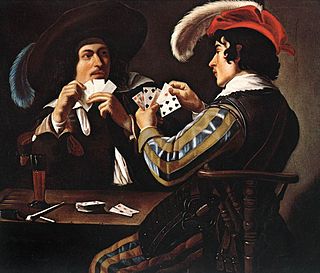
A card game is any game that uses playing cards as the primary device with which the game is played, whether the cards are of a traditional design or specifically created for the game (proprietary). Countless card games exist, including families of related games. A small number of card games played with traditional decks have formally standardized rules with international tournaments being held, but most are folk games whose rules may vary by region, culture, location or from circle to circle.

A trick-taking game is a card or tile-based game in which play of a hand centers on a series of finite rounds or units of play, called tricks, which are each evaluated to determine a winner or taker of that trick. The object of such games then may be closely tied to the number of tricks taken, as in plain-trick games such as contract bridge, whist, and spades, or to the value of the cards contained in taken tricks, as in point-trick games such as pinochle, the tarot family, briscola, and most evasion games like hearts. Trick-and-draw games are trick-taking games in which the players can fill up their hands after each trick. In most variants, players are free to play any card into a trick in the first phase of the game, but must follow suit as soon as the stock is depleted. Trick-avoidance games like reversis or polignac are those in which the aim is to avoid taking some or all tricks.

Uno, stylized as UNO, is a proprietary American shedding-type card game originally developed in 1971 by Merle Robbins in Reading, Ohio, a suburb of Cincinnati, that housed International Games Inc., a gaming company acquired by Mattel on January 23, 1992.

Crazy Eights is a shedding-type card game for two to seven players and the best known American member of the Eights Group which also includes Pig and Spoons. The object of the game is to be the first player to discard all of their cards. The game is similar to Switch and Mau Mau.
Spite and malice, also known as cat and mouse, is a relatively modern American card game for two or more players. It is a reworking of the late 19th century Continental game crapette, also known as Russian bank, and is a form of competitive solitaire, with a number of variations that can be played with two or three regular decks of cards.
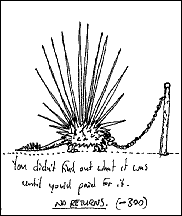
1000 Blank White Cards is a party game played with cards in which the deck is created as part of the game. Though it has been played by adults in organized groups worldwide, 1000 Blank White Cards is also described as well-suited for children in Hoyle's Rules of Games. Since any game rules are contained on the cards, 1000 Blank White Cards can be considered a sort of nomic. It can be played by any number of players and provides the opportunity for card creation and gameplay outside the scope of a single sitting. Creating new cards during the game, dealing with previous cards' effects, is allowed, and rule modification is encouraged as an integral part of gameplay.
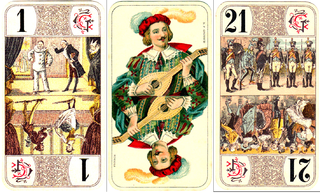
The game of French Tarot is a trick-taking strategy tarot card game played by three to five players using a traditional 78-card tarot deck. The game is the second most popular card game in France and is also played in French-speaking Canada. It should not be confused with French tarot, which refers to all aspects of cartomancy and games using tarot cards in France.

Bourré is a trick-taking gambling card game primarily played in the Acadiana region of Louisiana in the United States of America. It is also played in the Greek island of Psara, with the name Boureki. The game's closest relatives are probably Spades and Euchre; like many regional games, Bourré sports many variant rules for both play and betting considerations.

Rummy is a group of games related by the feature of matching cards of the same rank or sequence and same suit. The basic goal in any form of rummy is to build melds which can be either sets or runs and either be first to go out or to amass more points than the opposition.
Pedro is an American trick-taking card game of the All Fours family based on Auction Pitch. Its most popular variant is known as Cinch, Double Pedro or High Five which was developed in Denver, Colorado around 1885 and soon regarded as the most important American member of the All Fours family. Although it went out of fashion with the rise of Auction Bridge, it is still widely played on the western coast of the United States and in its southern states, being the dominant game in some locations in Louisiana. Forms of the game have been reported from Nicaragua, the Azores, Niobe NY, Italy and Finland. The game is primarily played by four players in fixed partnerships, but can also be played by 2–6 individual players.
Pitch is the American name of the English trick-taking game of Blind All Fours which, in turn, is derived from classic All Fours. Historically, Pitch started as "Blind All Fours", a very simple All Fours variant that is still played in England as a pub game. The modern game involving a bidding phase and setting back a party's score if the bid is not reached came up in the middle of the 19th century and is more precisely known as Auction Pitch or Setback.

Monopoly: The Card Game is loosely based on the board game Monopoly. The idea is to draw, trade and organize cards into "color-groups" along with bonus cards. Players take turns drawing and discarding cards until one completes a hand. The value of each player's hand is then counted and they receive the amount of Monopoly money they have earned. The first person to collect $10,000 wins.
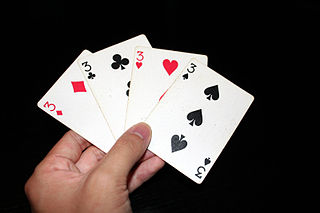
Liverpool rummy is a multi-player, multi-round card game similar to other variants of rummy that adds features like buying and going out. It is played the same as Contract rummy, except that if a player manages to cut the exact number of cards required to deal the hand and leave a face-up card, then the cutting player's score is reduced by 50 points.
Yaniv, also known as Yusuf, Jhyap, Jafar, aa’niv, Minca or Dave, is a card game popular in Israel. It is a draw and discard game in which players discard before drawing a new card and attempt to have the lowest value of cards in hand. The game is considered a backpackers game in Israel, and it's popular among soldiers and young adults returning from long backpacking trips.
Rat-a-Tat Cat is a memory card game designed by Monty and Ann Stambler and published by Gamewright. It won a Mensa Select award in 1996. The Washington Post described it as "like poker for kids".

Four color cards is a game of the rummy family of card games, with a relatively long history in southern China. In Vietnam the equivalent game is known as tứ sắc.

Continental Rummy is a progressive partnership Rummy card game related to Rumino. It is considered the forerunner of the whole family of rummy games using two packs of cards as one. Its name derives from the fact that it is played throughout the continental Europe, the United States, Mexico, Canada, and also in South America. According to Albert Morehead, it was "at one time the most popular form of Rummy in women's afternoon games, until in 1950 it lost out to Canasta."
Smear is a North-American trick-taking card game of the All Fours group, and a variant of Pitch (Setback). Several slightly different versions are played in Michigan, Minnesota, Northern and Central Iowa, Wisconsin and also in Ontario, Canada.
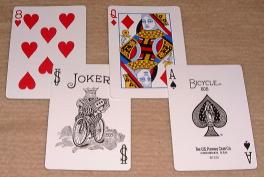
Ponytail canasta is a variation of the card game canasta. The rules for canasta were standardized in North America around the 1950s and it was this version of the game that gained worldwide popularity. In many countries, classic canasta is still played in more or less its original form, sometimes alongside a number of variations.

Egyptian Ratscrew (ERS) or Slap is a modern American card game of the matching family and popular with children. The game is similar to the 19th-century British card game beggar-my-neighbour, with the added concept of "slapping" cards when certain combinations are played, similar to and perhaps borrowed from Slapjack.













